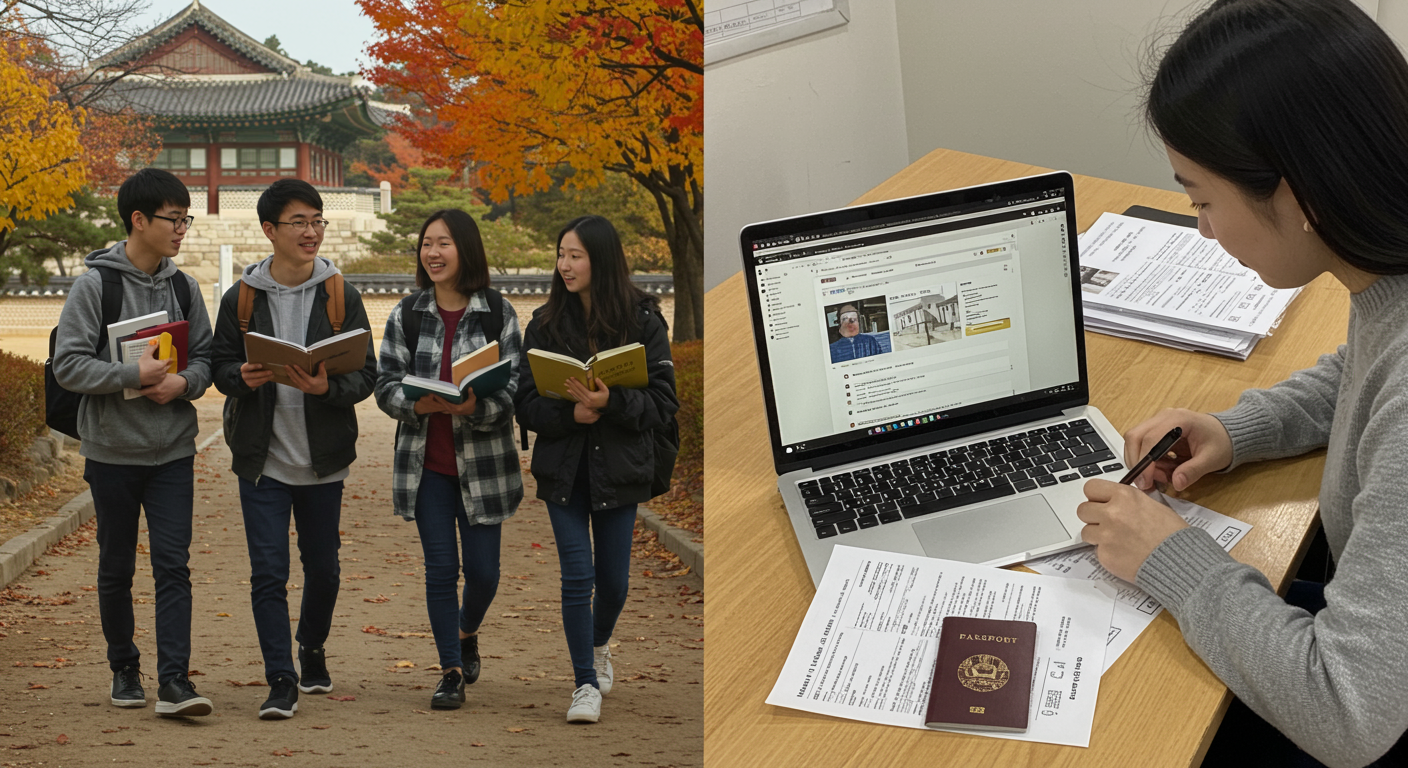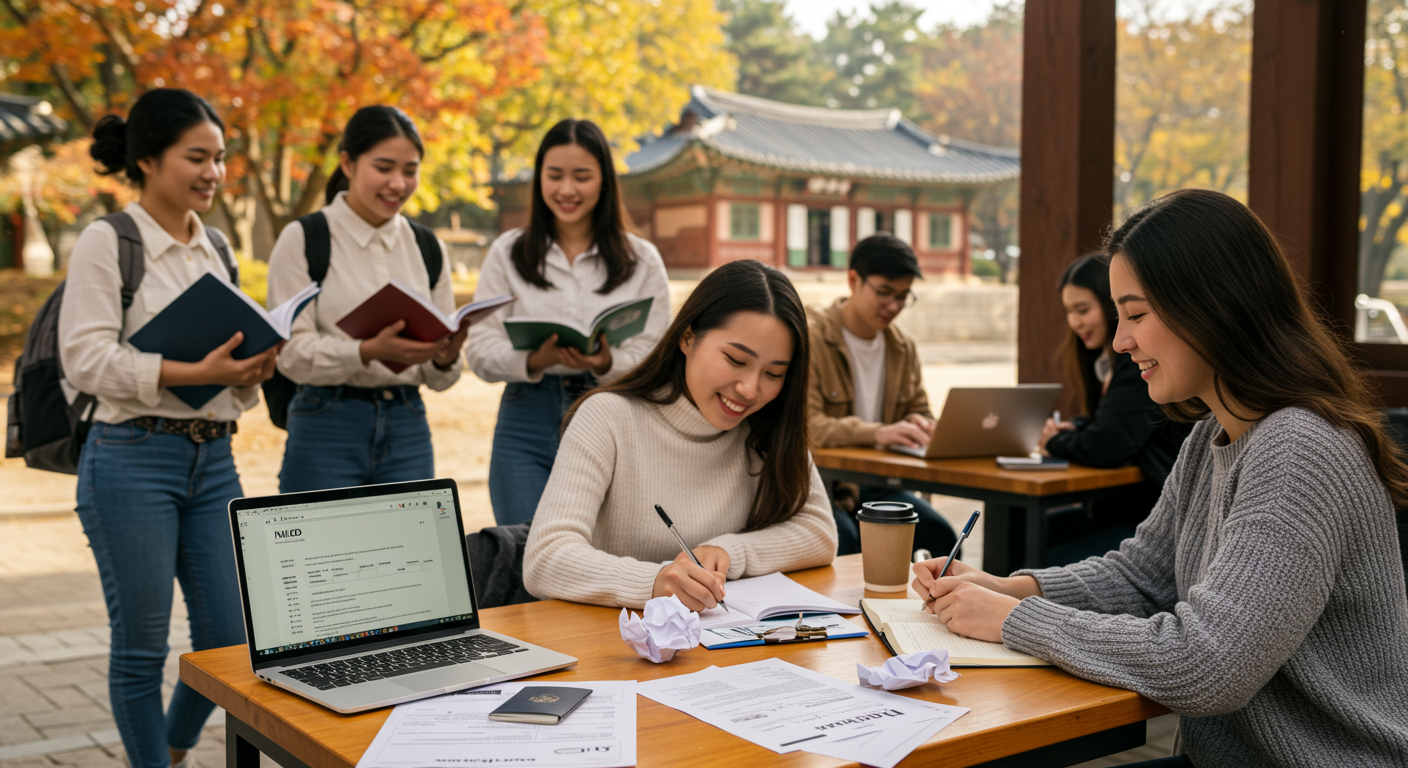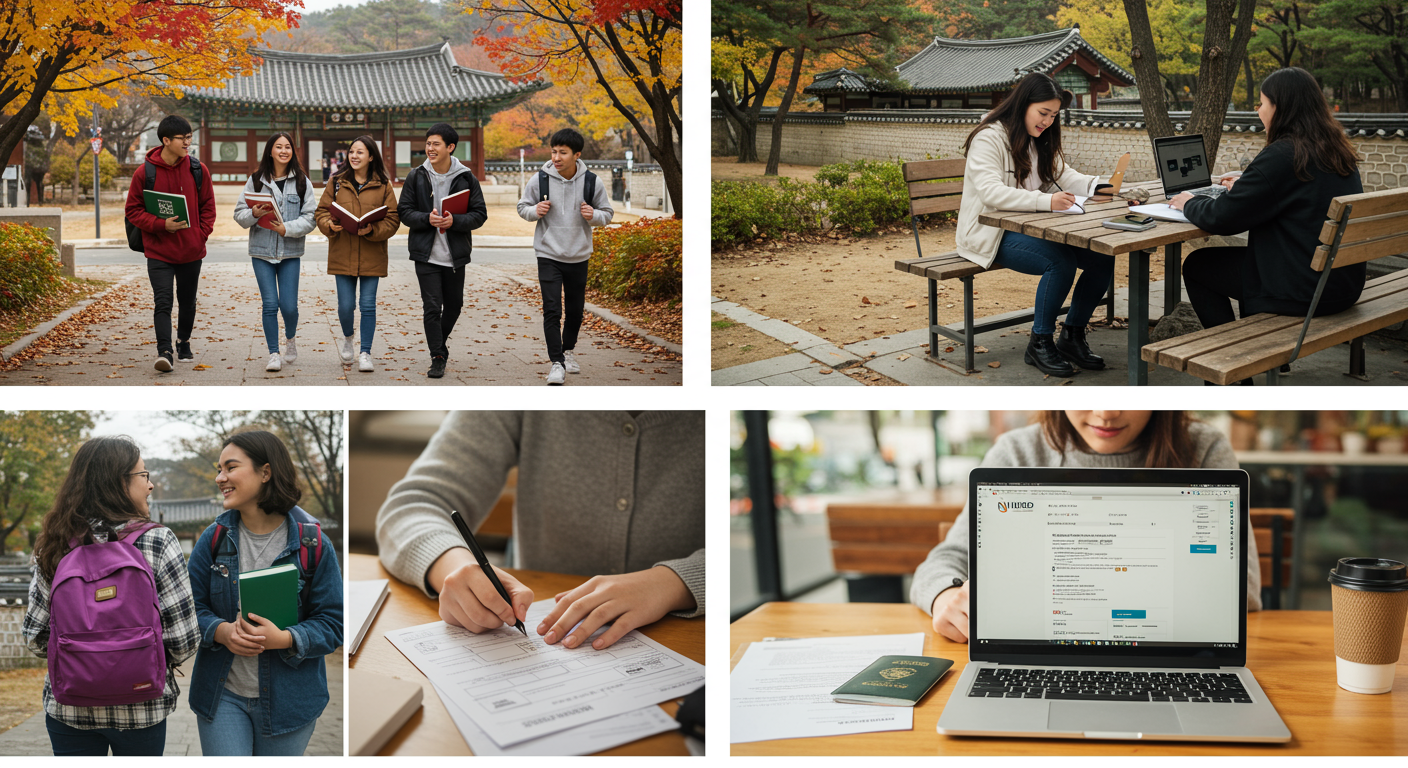Dreaming of Studying in Korea? The 2026 Global Korea Scholarship for Undergraduates Awaits!
Dreaming of Studying in Korea? The 2026 Global Korea Scholarship for Undergraduates Awaits!
Imagine yourself walking through the vibrant streets of Seoul, delving into ancient history in Gyeongju, or mastering cutting-edge technology in Daejeon – all without the burden of tuition fees. Sounds like a dream, right?
Hey everyone! I’ve been hearing a lot of buzz lately, and if you’ve ever considered studying abroad, especially in the dynamic and culturally rich South Korea, then this news is for you. The Ministry of Education and the National Institute for International Education (NIIED) just made a huge announcement that could change your life. We're talking about the highly coveted 2026 Global Korea Scholarship (GKS) for undergraduates! As someone who's seen countless students navigate these waters, I know how overwhelming it can feel. But trust me, this is an opportunity you absolutely do not want to miss. Let's dive in and break down everything you need to know.
Table of Contents
What is the Global Korea Scholarship (GKS)?
The Global Korea Scholarship, affectionately known as GKS, is more than just financial aid. It's a prestigious, fully funded scholarship program run by the South Korean government, designed to bring talented international students to Korea for higher education. The ultimate goal? To foster global education exchange and build friendly relations between countries. Honestly, it's one of the most comprehensive scholarships out there, covering everything from tuition and airfare to living expenses and even Korean language training. Think of it as a golden ticket to immerse yourself in Korean culture, learn the language, and get a world-class education. I've seen students thrive under this program, not just academically but personally too. It truly opens up a world of possibilities!
 Description: "A diverse group of young, smiling international students, aged 18-24, walking through a modern university campus in South Korea during autumn. They are holding books and talking animatedly, with traditional Korean architecture visible in the background, rendered in a realistic photo style."
Description: "A diverse group of young, smiling international students, aged 18-24, walking through a modern university campus in South Korea during autumn. They are holding books and talking animatedly, with traditional Korean architecture visible in the background, rendered in a realistic photo style."
Who Can Apply? Eligibility & Requirements
Now, let's get down to the brass tacks: Are you eligible? The GKS undergraduate program is quite specific about who it accepts, and it’s important to check these boxes meticulously. The requirements are designed to ensure that the most promising and dedicated students get this incredible opportunity. From my experience, many aspiring applicants overlook small details, so pay close attention!
Here’s a snapshot of the general eligibility criteria for the 2026 Global Korea Scholarship for undergraduates. Remember, specific requirements can vary slightly each year, so always check the official NIIED announcement for the most up-to-date details.
| Category | Requirement | Important Notes |
|---|---|---|
| Citizenship | Applicant and parents must be non-Korean citizens. | Cannot hold Korean citizenship, even dual. |
| Age | Must be under 25 years old as of March 1st, 2026. | Precise birthdate cut-off will be specified in guidelines. |
| Education | Must have graduated or be expected to graduate from high school by March 1st, 2026. | A high school diploma (or equivalent) is essential. |
| Grades | Cumulative GPA must be 80% or higher, or be in the top 20% of your class. | Specific GPA conversion scales provided by NIIED. |
| Health | Must be in good health, both mentally and physically, for study abroad. | Required medical examination after selection. |
Navigating the 2026 Application Process & Key Dates
Alright, the moment you’ve been waiting for! The NIIED officially announced the 2026 GKS application period for undergraduates starting September 15th. While the exact closing date isn't fully specified in the initial news (it says "to O"), typically these application windows last for several weeks, sometimes even a couple of months, depending on the track you choose. It's crucial to understand there are two main application tracks: the Embassy Track and the University Track. Each has its own timeline and slight variations, so clarity here is key. From my experience, rushing this process is the biggest mistake you can make!
Here's a generalized step-by-step breakdown of what the application process usually looks like:
- Read the Official Guidelines Thoroughly: This is step one, before anything else. The NIIED always releases a detailed "Application Guidelines" document. It contains all the forms, specific requirements, and precise deadlines. Seriously, don't just skim it; read every single word.
- Choose Your Application Track:
- Embassy Track: Apply directly to the Korean Embassy in your home country. If selected, you can choose up to three different universities. This path usually has earlier deadlines.
- University Track: Apply directly to a specific Korean university that participates in the GKS program. You apply to only one university through this route.
- Prepare Required Documents: This is the most time-consuming part. You’ll need transcripts, diplomas, letters of recommendation, a personal statement, study plan, proof of citizenship, and sometimes even a medical check-up form. Make sure everything is translated into English or Korean and apostilled/consular-confirmed if required. Start collecting these NOW!
- Submit Your Application: Follow the submission instructions for your chosen track. This usually involves mailing physical documents, but some universities might have online portals as well. Ensure it’s submitted well before the deadline!
- Participate in Interviews/Exams (If Required): If you pass the document screening, you might be invited for an interview (especially for the Embassy Track) or an entrance exam (for some University Track programs).
- Await Results: Patience is a virtue here. The selection process takes time, with multiple rounds of evaluation.
 Description: "A close-up of a young female student, early 20s, intensely focused on filling out complex application forms at a wooden desk. Her laptop shows the NIIED website, and several neatly organized documents, including a passport and transcript, are spread around. The scene has a serious yet hopeful atmosphere, depicted in a realistic photograph style."
Description: "A close-up of a young female student, early 20s, intensely focused on filling out complex application forms at a wooden desk. Her laptop shows the NIIED website, and several neatly organized documents, including a passport and transcript, are spread around. The scene has a serious yet hopeful atmosphere, depicted in a realistic photograph style."
Crafting a Winning GKS Application: My Expert Tips
After years of advising students on scholarships, I've noticed a few things that consistently set successful GKS applications apart. It's not just about grades; it's about telling your story, demonstrating your passion, and showing them why *you* are the perfect fit. Don't underestimate the power of a compelling narrative!
- Start Early, Like Yesterday: This is probably the most crucial tip. Gathering documents, getting recommendations, writing essays – it all takes time. Rushing leads to mistakes and stress.
- Personal Statement & Study Plan are Key: This is where you shine! Don’t just list achievements. Tell a story. What sparked your interest in Korea? How will studying your chosen field in Korea help you achieve your future goals? Be specific, heartfelt, and connect your past experiences to your future aspirations. This is where your unique insight and passion truly stand out.
- Strong Letters of Recommendation: Choose recommenders who know you well and can speak to your academic abilities, character, and potential. Give them ample time and provide them with your resume and personal statement to help them write a tailored letter.
- Show Your Korean Language/Culture Interest: While not always mandatory for undergraduates, any proof of Korean language proficiency (TOPIK scores) or active engagement with Korean culture (volunteer work, K-pop/drama club, etc.) can significantly boost your application. It shows genuine commitment beyond just the scholarship itself.
 Description: "A confident young woman, early 20s, sitting at a cafe table with a laptop open, passionately writing. She has a cup of coffee beside her and several crumpled papers, indicating effort. The background is a blurred, warm cafe interior. The image should convey determination and creativity, in a semi-realistic, slightly artistic style."
Description: "A confident young woman, early 20s, sitting at a cafe table with a laptop open, passionately writing. She has a cup of coffee beside her and several crumpled papers, indicating effort. The background is a blurred, warm cafe interior. The image should convey determination and creativity, in a semi-realistic, slightly artistic style."
Life After Application: What Happens Next?
So, you've hit "submit" or mailed off your carefully prepared package. What now? The waiting game begins, and believe me, it can feel like forever! But understanding the general timeline can help manage expectations and anxiety. Typically, the GKS selection process involves several stages, and each stage has its own announcement period. Don't be surprised if it takes a few months from initial submission to final results.
- First Round Selection (Embassy/University): This is where your initial application is reviewed. If you applied via the Embassy Track, your country’s embassy makes the first cut. If via the University Track, the university does. Expect results a few weeks to a month after the submission deadline.
- Second Round Selection (NIIED Evaluation): Successful candidates from the first round move on to NIIED for a comprehensive evaluation. This is where your application competes with candidates from all over the world. This is usually followed by a final interview for Embassy Track candidates.
- University Admissions & Final Announcement: For Embassy Track candidates, NIIED sends your application to your chosen universities. For University Track, if you passed NIIED’s review, you're usually in! The final list of successful GKS scholars is then announced. This part can be a roller coaster of emotions, but keep your eyes on the NIIED website!
Is GKS Right for You? Why This Scholarship Matters
Let's be real, applying for a scholarship like GKS is a huge undertaking. It demands time, effort, and a whole lot of patience. But the rewards? They're immeasurable. Beyond the obvious financial benefits, GKS offers a truly transformative experience. You'll gain a global perspective, master a new language, connect with people from diverse backgrounds, and develop a resilience you never knew you had. I’ve seen students come back from GKS programs not just with degrees, but with a whole new outlook on life, ready to tackle any challenge. It's an investment in yourself that pays dividends for years to come.
If you have a genuine passion for learning, a desire to experience Korean culture firsthand, and the drive to contribute to a global community, then the 2026 Global Korea Scholarship for undergraduates is absolutely worth pursuing. Don't let the paperwork intimidate you. See it as your first challenge on an incredible journey. Good luck, future scholars!
Frequently Asked Questions (FAQ) about GKS
Yes, applicants must typically be under 25 years of age as of March 1st, 2026. Always check the official guidelines for the exact cutoff date.
Yes, for the undergraduate program, applicants must generally be under 25 years old as of March 1st of the scholarship year (so, March 1st, 2026, for the 2026 intake). It’s a pretty strict rule, so make sure to double-check the detailed guidelines once they are fully released by NIIED for any specific date mentions.
While not always strictly mandatory at the time of application for undergraduates, demonstrating some Korean language proficiency or a strong interest in learning Korean can significantly boost your application.
While not always strictly mandatory at the time of application for undergraduates, demonstrating some Korean language proficiency (like a TOPIK score) or even just a strong, genuine interest in learning Korean and experiencing Korean culture can definitely strengthen your application. The GKS program usually includes a year of mandatory Korean language training, so they expect you to learn once you arrive. But showing initiative beforehand is always a plus!
The Embassy Track means you apply through the Korean Embassy in your home country and can list up to three universities. The University Track means you apply directly to one specific Korean university.
The main difference lies in where you submit your initial application. With the Embassy Track, you apply to the Korean Embassy in your home country. If you pass their screening, your application is then forwarded to NIIED, and you can usually choose up to three preferred universities. This track often has higher competition but can offer more university choices. For the University Track, you apply directly to one specific university in Korea that participates in GKS. This means you need to be very clear about which university and major you want to pursue from the start.
Yes, the GKS is widely considered fully funded. It typically covers airfare, tuition fees, monthly living allowances, Korean language training fees, medical insurance, and sometimes even research support and settlement allowances.
Generally, yes! The GKS is famous for being incredibly generous. It usually covers round-trip airfare, full tuition fees for your degree program (including the language program), a monthly living allowance, medical insurance, and even a settlement allowance upon arrival. Sometimes, there are also research grants or thesis printing costs covered. It's designed to let you focus on your studies without financial worry, which is pretty amazing!
Comments
Post a Comment